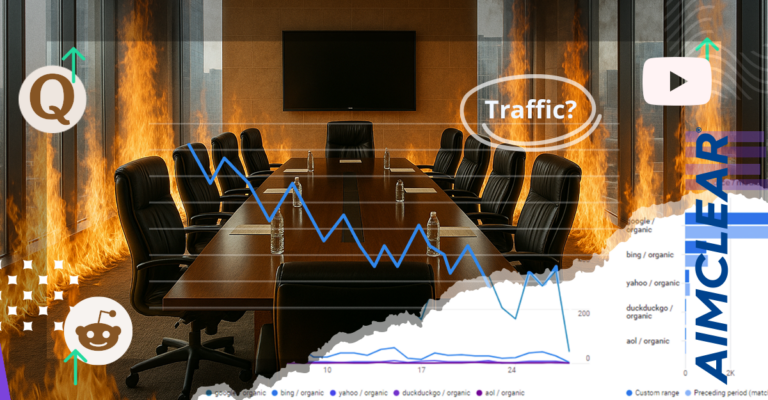Marissa Mayer, Vice President of Search Products & User Experience at Google, charmed SES in a dialog this morning with Conference Chair Danny Sullivan. Her demeanor was colloquial, firm, deep, focused and simple.
She discussed Google’s moves in search including recent roll outs which added more personalized and “universal” search results and referred to Google verticals as her “children.” Marissa oversees products ranging from Web Search and iGoogle and was one of Google’s first employees. This is a very powerful lady.
Universal Search
“Universal search was a really big change for Google” all the way to the infrastructure level. Literally the servers were reconfigured. “The idea for Universal search was to move away from templates to help provide a better user experience. “Maps, news, images, video, and books, blogs and academic writings are already or will be included in the results.
10 blue links
Yesterday Jim Lanzone chided that Ask.com is not about “10 blue links.” Marissa responds with a coy smile and speaks about “focus on function before form.” “We need to make sure it works really well for the user and then focus on the other piece. Users want to get to results quickly.” In terms of relevance Google’s research indicates that ordered lists still work. “We need to think more about the task of what users are doing and respond to that” says Marissa.
Dramatic Shifts Afoot
“Changing out the infrastructure opens up a new playground for us.” Google can actually go out and gather results from sources like news and we’re just starting to play with that.” The mission is to organize the world’s information and make it accessible and useful. For instance it’s very important to be able to search all of the world’s video content no matter where it is served from.
The Future of Search
There are already tens of millions of personalized search users. Marissa clarifies that “Personalized search is a new science.” What will be true in 15 years she asks? “Google gets better every day and Google will understand more about the user that’s using it.” Personalized search is still in it’s infancy and portends more relevant results in the future… and “Google is experimenting.”
Personalized Results
She say that an important behavior signal to improve the relevance of SERPs is taking note of the phrase any user queried immediately prior. Organic results are now affected by the users’ most recent query as are paid search results. Google seeks parity in how they serve ads and organic results as important.” Transparency and control are the keys for Google so that users can line-item remove web history items so personalized search is not based on potentially irrelevant signals from previous search history and/or privacy is not compromised.
Google has considered marking search results as personalized. However, since there is a spectrum of how much certain SERPs are affected by behavioral signals, “marking results does not seem to be the right model moving forward.” Google has also considered a toggle to turn personalized search on and off but personalized results are going to be the default mode in the future so that sends the wrong message. There are mechanisms available at this point to disable personalized search but they are rather complicated to get at.
Privacy Concerns from Google’s Perspective
For users who want to see a relevance boost they need to sign up for a Google service. The data retention policy is straight forward. Google puts your personalized data on systems that are more protected. If you’re not signed into a Google account the logs are anonymous. Marissa is big on building trust with users.
Google and FaceBook
Google has been very happy with iGoogle and Gadgets and she sees a lot of parallels with what FaceBook is doing. “There is a similar vein between both services. The power of these programs is that they are “open” platforms. That’s why these programs have been growing.”
Google thinks that Gadgets and FaceBook both provide excellent opportunities for users. “Gadgets and FaceBook are both basically new forms of advertising. It’s not just a banner or a piece of text.” With FaceBook applications and Widgets, advertisers can actually provide information that’s responsive and interactive with users. Audiences can participate, advertisers get better distribution and connect more with audiences.
Wikis
Google is often painted as an insensitive algorithmic machine operating without humans. Marissa explains that “10’s of billions indexed pages require comprehensiveness. Once you have those basic algorithms in place you can layer the human element on top of it.” Google Coop and Notebook are experiments in humans moderating content. “The best answer is to layer both algorithms and human moderation to achieve next layer of relevance. Marissa sees book search as a “really great endeavor and a cause.”
Street View
Marissa clarifies that Street View is fundamentally about finding things faster. When users’ seek local information it’s nice to be able to see what the destination looks like. The product is not about license plates and faces and now Google is trying to blur these attributes. Street View is not about outing folks.
Local and Mobile
Google sees more and more mobile activity. There are even measurable shifts as users switch off their computers and on to their mobile handsets when they go on vacation. Call Google Free 411 and at any point during the call you can say “Map It” from your iPhone and you receive an SMS message that has a link back to maps, lists, satellite views, live traffic and other really cool iPhone integration. Google clearly loves the iPhone.
Marissa Mayer Blog Posts
Official Google Blog: Back to basics
Official Google Blog: Universal search
Google’s Marissa Mayer on The Future of Search
Marissa (BETA) (Maybe she should ask her engineer pals to remove this one from the index J
Dare Obasanjo aka Carnage4Life – Google Scalability Conference
Marissa Mayer Interview on Personalization
Just Behave: Google’s Marissa Mayer on Personalized Search








